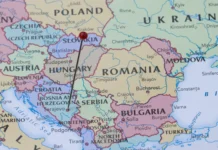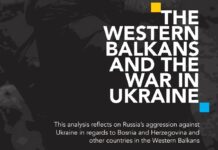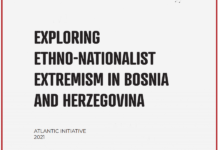Sarajevo, Bosnia – On November 21, 2011, Balkanalysis.com contributor Maja Šoštarić conducted a briefing with Dr Vlado Azinović, Secretary General of the Atlantic Initiative in Bosnia and Herzegovina.
The Atlantic Initiative, together with the Democratization Policy Council (DPC), has recently published a report entitled “Assessing the Potential for Renewed Ethnic Violence in Bosnia and Herzegovina: A Security Risk Analysis.”
Dr Azinović is co-author of the report, together with the DPC’s Kurt Bassuener and Bodo Weber. In the report, the authors address multiple variables that could eventually lead to renewed ethnic violence in Bosnia and Herzegovina. The report argues that there are factors which can lead the scholars and observes to believe that a rise in violence is indeed possible in Bosnia and Herzegovina.
According to the report, there are several risks of instability in the coutry: a division within the international community, the weakness of the Bosnian state institutions and its security sector, the impact of the global economic crisis on the country’s weak economy, inflammatory political rhetoric and hate speech, football hooligans and juvenile delinquency, minority returnees as well as terrorism and radicalism.
In the briefing, Dr Azinović reiterated several important points stressed by the report. Should violence occur in Bosnia and Herzegovina, there is a worry that EUFOR, due to a considerable lack of the troops consistently reduced since 2007, will not be unable to contain potential violent tendencies. In this sense, Dr Azinović emphasized that EUFOR’s presence should be strengthened.
Moreover, the report insists that the country should not be allowed to fall apart. A necessary shift in the international stance toward Bosnia would imply (at least) tacit acceptance of the fact that the path pursued since 2005 has failed and must be redesigned. The new strategic goal for Bosnia must be its smooth functioning in order to meet the requirements to join the EU and NATO.
Finally, Dr Azinović presented several recommendations from the report. It takes several elements to restore credible deterrence in the country: additional troops from EU and non-EU members; EU/NATO member PIC SB countries not presently participating in EUFOR should make significant contributions; sufficient helicopter lift for a quick reaction force based at Butmir of at least platoon strength, but preferably company strength; forward deployment in company strength to obvious potential flashpoints like Brčko and Mostar; regular patrols between Tuzla airfield and Brčko, also to areas of minority return; as well as a de-emphasis on EUFOR activities not directly linked to the Chapter 7/Annex 1A SASE mandate.
The report concludes that only “restored, credible deterrence is the sine qua non of any political and social progress in Bosnia and Herzegovina.”
—————————————————–
The Atlantic Initiative (AI) is a non-profit and non-governmental organization, established in Sarajevo in 2009, by a group of university professors, lecturers and journalists, who share common concerns for the future of Bosnia-Herzegovina, particularly its slow-paced accession to NATO and European Union.
Thus far, the Atlantic Initiative has been carrying out partnership projects with governments of Norway and the United Kingdom, and enjoys support from the NATO HQ Sarajevo, Bosnian Ministries of Foreign Affairs and Defense, George Marshall Alumni Association in Bosnia and Herzegovina, as well as donations from DCAF (Geneva Center for Democratic Control of Armed Forces), and cooperation with a number of similar non-governmental organizations in the region.
Balkanalysis.com is an American research and analysis firm that provides dedicated coverage of the Balkan and Eastern Mediterranean regions, in areas ranging from politics and security to economics and culture. It draws on the expertise of its broad network of field analysts and reporters representing a number of various countries and professional backgrounds.
Balkanalysis Briefings is a regular series in which correspondents of Balkanalysis.com, sometimes in affiliation with partner organizations, engage with representatives of companies, governmental institutions, non-governmental groups and other organizations professionally involved with the Balkan and Mediterranean regions in order to gain insight into issues, trends and other factors affecting present and future developments in the area. This process contributes to better analytical and prognostic research, allowing Balkanalysis.com to better serve its readers, while also providing Briefings partners an opportunity to make their products, services and goals better and more clearly known among those most actively involved with the region.
Source: Link (24. November 2011.)








